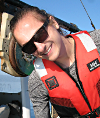
Telephone: (418) 656-2131 #408455
Assessing the effect of river temperature on reproductive success of catch-and-released Atlantic salmon (Salmo salar, L.)
Anadromous Atlantic salmon (Salmo salar) is a species of biological as well as cultural and economic importance. Population declines, however, have also made it a species of conservation concern. Historically, anthropogenic habitat destruction and overexploitation have severely reduced the range of the species in the United States and reduced abundance in southern Canada with more recent declines possibly resulting from increased mortality at sea. In addition, the species is popular with the sport fishing industry, which targets adults returning from their marine migrations to spawn. One frequently applied and promoted means to cope with high angling effort is catch & release (C&R) angling. C&R refers to the process of capturing fish by using hook and line, mostly assisted by rods and reels, and then releasing live fish back to the waters where they were captured, presumably to survive unharmed. The effectiveness of C&R relies on the assumption that released fish survive and reproductively contribute to the exploited populations. Until now, only one study has directly documented the reproductive success of C&R Atlantic salmon. Their results have shown that C&R salmon had the same probability of reproduction as noncaught salmon. However, water temperature elevation negatively impacted reproductive success of salmon in the temperature range of 12-19°C. Thus, the goal of my project is to document the impact of C&R on reproductive success of Atlantic salmon in a river which is known to go beyond its optimal temperature (>20°C) during fishing season. This study will rely on microsatellite loci to establish parentage relationship of parents and offspring. Results from parentage analysis will then be used to directly compare individual reproductive success of C&R salmon to noncaught salmon. Thus, these data will unravel the effect of C&R on reproductive success beyond optimal temperature at a wild Atlantic salmon population scale. Finally, the project will allow the Ministry of Forest, Parks and Fauna to judge if a water temperature threshold is needed to define closing triggers of recreative fishing and, thus, optimise our conservation and management strategy in a climate change era.